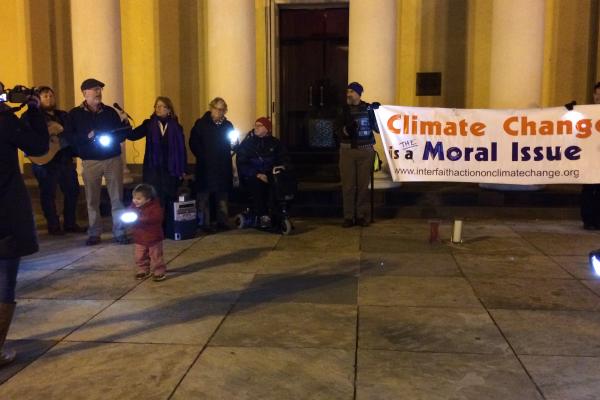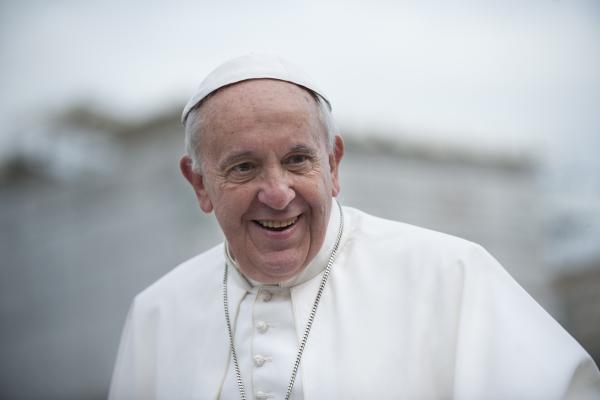Sunday night, people of all faiths gathered across the world for interfaith prayer vigils for the U.N. Framework Convention on Climate Change (UNFCCC) in Lima. In 13 countries, participants in #LightForLima prayer gatherings joined together in solidarity for collective song and prayer in hope that the negotiators at the UNFCCC will make decisions that will preserve the state of the earth for future generations.
Organized by the international multi-faith organization OurVoices, groups in Sydney, Ottawa, New York, London, and Washington, D.C., and elsewhere joined together to light up solar lamps and candles to share hope for successful negotiations in Lima. Desmond Tutu provided groups with this powerful prayer which was read at vigils across the globe last night:
Holy God, earth and air and water are your creation, and the web of life is yours.
Have mercy on us in the face of climate chaos.
Help us to be keepers of your Earth:
to simplify our lives,
to reduce our use of energy,
to share the resources you have given us,
to raise our voices for justice
and to bear the cost of change.
We kindle this “light for Lima” as we pray for the climate change negotiations in Lima, Peru.
Jordyn Garrett left home so he could become Olivia. Lerato “Lee” Mokobe left South Africa to pursue her dreams, but can’t return because of the dangers her home life and culture posed to her identity. Sarah Silva left her home because of sexual abuse and unhealthy family relationships.
They’re not even old enough to rent a car, and yet they’re living homeless in New York City. But these and other young adults found themselves a family in the Reciprocity Foundation.
The Reciprocity Foundation is a nonprofit dedicated to helping the city’s homeless youth realize their full potential by developing their passions and reconnecting with their spiritual side. Many of the youth they work with are people of color or part of the LGBT community, and many come from religious backgrounds.
“Many (of these youth) feel negatively towards religion since it has contributed to their isolation from their family and/or homelessness,” said Taz Tagore, a Reciprocity co-founder.
Director Jean-Marc Vallee (The Dallas Buyer’s Club) and writer Nick Hornby (author of High Fidelity and About a Boy) attempt valiantly to solve this problem, and achieve some moments of real beauty in the process. However, they never quite find a way to effectively connect Strayed (Reese Witherspoon) in her lowest moments, which include heroin addiction, the termination of a pregnancy, and divorce, with the woman we’re watching hike from Mexico to Canada — a woman who, while troubled, seems to have it considerably more together.
It also doesn’t help that the conversations Strayed does have on the trail tend towards the kind of dialogue that feels less like natural conversation and more like a talk between archetypes spouting bumper-sticker wisdom. The conversations that come up, about choices, regrets, and mistakes made, are all valuable. But the way they happen feels sanitized.
Ultimately, Wild does manage to present some solid thoughts on the process of grief and redemption. Strayed’s observation that everything in her life, both good and bad, led her to becoming a stronger, better person is important. Just as important is the film’s point that our relationships with others are vital to our survival and growth.
There’s no doubt that Strayed’s own experience was powerful and tough. But in its translation to film, particularly a film with a plot and performance tailor-made for awards season, Wild is a movie that’s afraid to upset people. It acknowledges the hard stuff, but barely hints at the true emotional complexities of its story and of its main character. Where it ought to challenge, it merely suggests. And while that’s okay, it’s disappointing that it isn’t more.
“There is neither Jew nor Greek, there is neither slave nor free, there is no male and female, for you are all one in Christ Jesus.” Galatians 3:28
Thirty-five million people are trapped in a form of modern slavery.
35 million. Let that sink in.
Last week, the campaign to end human trafficking took a large step forward. Religious leaders from the Christian Catholic, Anglican, and Orthodox traditions joined with Hindu, Buddhist, Jewish, and Muslim leaders to jointly declare their intention to end modern-day slavery. The Joint Declaration of Religious Leaders Against Modern Slavery reads:
We pledge ourselves here today to do all in our power, within our faith communities and beyond, to work together for the freedom of all those who are enslaved and trafficked so that their future may be restored. Today we have the opportunity, awareness, wisdom, innovation and technology to achieve this human and moral imperative.
The moral imperative to end human slavery transcends every religious doctrine.
Christian Scripture affirms that “there is neither slave nor free, for you are all one in Christ.” The Qu’ran confirms the divine dignity of each human stating, “God has given dignity to the all children of Adam” (The Noble Qur’an, 17:70). The command to “protect the stranger in our midst” (Exodus 22:21) appears 36 times in the Torah — which according to the Talmud is more often than the laws of the Sabbath or of keeping kosher. Hindu leader, Her Holiness Mata Amritanandamayi called human enslavement, “an open wound on the body of modern society.”
Each major religious tradition acknowledges the inherent God-given dignity of each being. An excerpt from the declaration affirms that:
In the eyes of God, each human being is a free person, whether girl, boy, woman or man, and is destined to exist for the good of all in equality and fraternity. Modern slavery, in terms of human trafficking, forced labour and prostitution, organ trafficking, and any relationship that fails to respect the fundamental conviction that all people are equal and have the same freedom and dignity, is a crime against humanity.
An international faith declaration will not change the complex causes, intricate networks and international power structures that run deeply through the roots of modern slavery.
Yet, it is a start.
Gay marriage was never on the agenda at the recent Bishops’ Synod on the Family and the subject “did not cross our minds,” Pope Francis said in a new headline-grabbing interview.
Keeping to a format that has become a favorite for this pope, Francis used a high-profile interview to shed light on his thinking, and Vatican policies, on a number of hot-button social issues.
In an interview published Dec. 7, Francis told the Argentine daily, La Nacion, that the Catholic Church must help parents support their gay children. At the same time, he maintained that allowing, condoning or even adapting to same-sex marriage was still not on the church’s agenda.
This was one of several controversial issues he broached in the interview with papal biographer Elisabetta Pique:
Imagination is defined as, "The faculty of imagining or of forming mental images or concepts of what is not actually present to the senses."
For privileged Christians who have lived the majority of their lives receiving the benefits of systematic wealth, power, comfort, favor, and convenience, it can be almost impossible to conceive of a world where injustice, inequality, and perpetual oppression are daily struggles.
Many privileged believers experience an entire existence completely devoid of the suffering, trials, and endless forms of racism, stereotyping, and injustice that are the daily realities faced by the likes of Trayvon Martin, Michael Brown, Eric Garner, and millions of others who have lived under completely different — and radically unfavorable — circumstances.
Thus when parties from both sides try to communicate with one another, it is extremely difficult, frustrating, and nearly impossible to even begin to comprehend each other’s worlds — unless you utilize the spiritual discipline of imagination.
In the Bible, Jesus is constantly challenging the status quo and striving for justice, peace, and reconciliation against cultural factors and precedents that seem impossible to overcome. For the human vessels that God calls upon, they are required to imagine the inconceivable, accept the unthinkable, and break out of their stubborn paradigms in order to embrace the Divine.
Not surprising, this whole endeavor to understand what it really means to follow Jesus in today’s world is proving to be nothing short of overwhelming. Though I’d like to start my year-long effort to live this out on New Year’s Day, I’m not entirely sure I can get my hands around this Jesus we’re talking about by then. I mean, I grew up reading Scripture, have written several books about Jesus and the Bible, but somehow I’m always left with a sense that there’s more — a lot more — about Jesus and about being a follower than we generally consider.
As part of my effort to approach the year, I’ve decided to break down various dimensions of Jesus, based both on my own reading of the Gospels (and Epistles to a lesser degree), as well as the interpretations of scholars, theologians and activists I respect. So for now, I’ve broken this down into twelve categories, so that I can focus on one per month as intently as possible. This doesn’t mean that there aren’t some other things I’ll decide to do all year long (like pray the Lord’s Prayer), or some things I’ll try once that may or may not fit within that month’s “Jesus dimension.” But when I consider the following twelve ways of looking at Jesus, it feels like a pretty comprehensive approach.
I’m also assembling a group of mentors to help me with each of the respective Jesus Dimensions below. I figure that, rather than having a dozen disciples, I could use mentors way more than followers if I have any hope of making this work.
But I’m interested in what you think. Am I missing something? Do any of these simply not ring true at all?
You don’t want God to ask you to be a prophet. You really don’t.
When God calls you to some holy task, you might expect a contemplative path, a quiet life of service, and love of neighbor. You might expect a comfortable life of piety and hopefulness, grace, and caring.
But true prophets know better.
Prophets tend not to have such idyllic hopes for God’s call. Prophets know too well that the call of God to speak hard truths is paved with difficulty. The prophet’s road is lonely not because she escapes the hubbub of everyday life in order to retreat and draw near to God. No, the prophet’s road is lonely because she is called to the most troubled corners of the world, places which existence we would rather deny or ignore. The prophet’s road is lonely because she must speak boldly to an upside-down world that doesn’t realize it is upside-down. The prophet sees the world as it really is while we see the prophet and marvel that she is walking on the ceiling.
In our readings for this week, we encounter two prophets who speak bold words to a world predisposed to ignore them. We encounter two prophets who speak a word of deliverance to the downtrodden and judgment upon the powerful. We encounter two prophets engaged with the most pressing matters of all. We encounter two prophets that we still refuse to heed.
This week, at a conference in Vienna, Austria on the humanitarian impact of nuclear weapons, Pope Francis issued a statement declaring that "nuclear deterrence cannot be the basis for peaceful coexistence between states."
A Vatican official told Sojourners in Vienna that the Holy See is seriously discussing whether the possession of nuclear weapons can be morally justified in our current multipolar world. The official quoted Pope John XXIII, who said "Nuclear weapons should be banned," and said that the time has come to embrace nuclear abolition.
The Vatican statement, titled "Nuclear Disarmament: Time for Abolition," argued that "the structure of nuclear deterrence is less stable and more worrisome than at the height of the Cold War," and said that "the very possession of nuclear weapons, even for purposes of deterrence, is morally problematic."
Since the beginning of the Cold War in the aftermath of World War II, the fundamental moral rationale for the possession of nuclear weapons has been the concept of deterrence. Simply put, the threat of massive annihilation rendered these weapons unusable — the very threat of such unacceptable destruction would, in theory, deter their use.
Wise men from the East came to Jerusalem, asking,
“Where is the child who has been born king of the Jews?
For we have observed his star at its rising,
and have come to pay him homage.”
They told him, “In Bethlehem of Judea;
for so it has been written by the prophet.” (Matthew 2:1b, 5 NRSV)
Waiting, preparing, journeying, hoping.
Advent.
Unless you’re newborn yourself, you may have experienced it before, many times over. Christianity’s rhythm is cyclic, repetitive. Still, in the same way that we can continually find new gusts of loveliness and truth in old Scriptures our eyes have taken in before, each Advent is a fresh encounter. Not because the story is new, but because the cosmos has changed – we have changed. The Word is new because the world is new.








